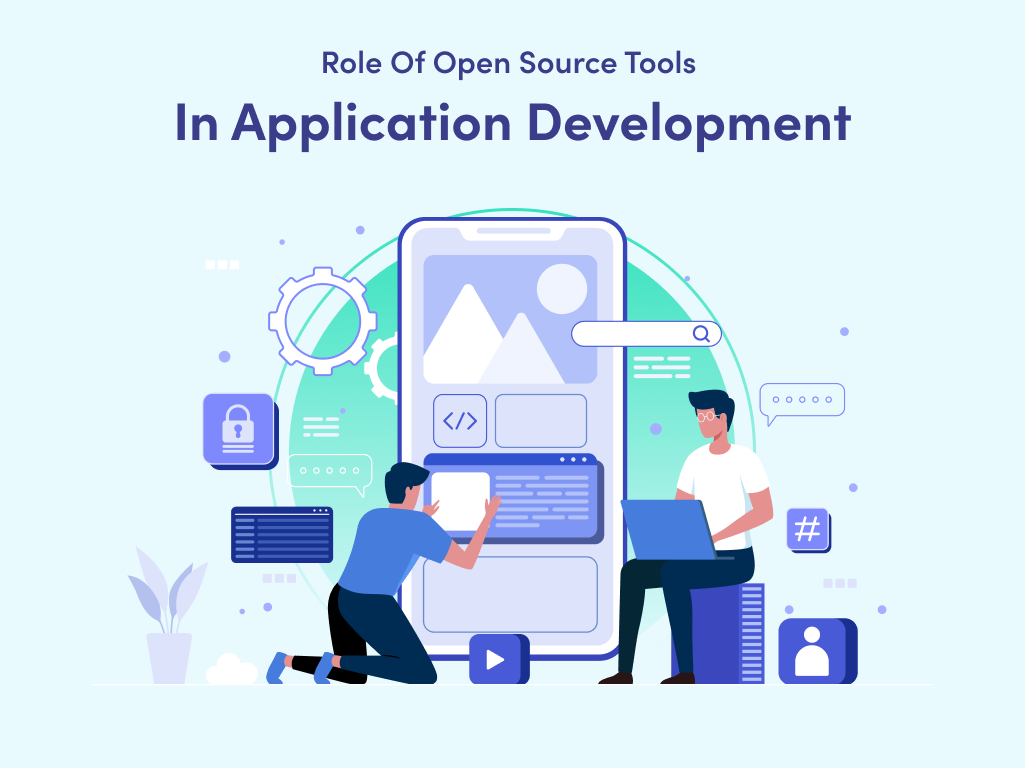In today’s rapidly evolving tech landscape, the importance of open-source tools in the application development life cycle cannot be overstated. Open-source software has become the backbone of countless applications and systems, powering everything from websites and mobile apps to large-scale enterprise solutions. This blog will delve into the role and myriad benefits of open-source tools in application development.
Understanding Open Source Tools in Application Development
Before we dive into the specifics, let’s establish a clear understanding of what open-source application development tools are and why they are distinct from proprietary counterparts. Open source tools are software programs whose source code is made available to the public, allowing anyone to view, modify, and distribute the code. This open collaboration fosters innovation and community-driven development. Also, this removes the need for paying for such softwares, and this is hence immensely important for a company to regulate the entire application development life cycle of a project.
Open-source licensing is a key feature that sets these tools apart. Licenses such as the GNU General Public License (GPL) and the Apache License permit developers to use, modify, and distribute open-source software freely, provided they adhere to certain terms and conditions, such as making their modifications available to the public.
Open-source tools or modern software development tools thrive on the principles of transparency, collaboration, and inclusivity. Developers worldwide contribute their expertise and knowledge, leading to robust, well-maintained software projects that cater to a wide range of needs.
Role of Open Source Tools in Application Development
Open-source tools in application development are not just handy; they’re indispensable at every stage of the application development journey. It is interesting to note that some of the trending software development tools and techniques arrive from the use of open-source tools in application development. Let’s understand their role more distinctly below:
Planning and Project Management:
Before a single line of code is written, open-source tools like Taiga and Trello aid in project planning and management. These tools help teams organize tasks, set priorities, and track progress seamlessly, which is a crucial feature to have for any software development company in the US.
Coding and Development:
At the heart of any application development process is coding. Here, open source shines with the likes of Git, an indispensable version control system. Git ensures that multiple developers can work on a project concurrently without stepping on each other’s toes. And let’s not forget the plethora of open-source programming languages and frameworks that empower developers to create robust applications, whether it’s web development using React, Angular, or Vue.js, or application logic with Python or Java.
Testing and Quality Assurance:
Once the code is written, open-source testing frameworks like Selenium and JUnit help ensure the application’s reliability and functionality. These tools automate testing, saving precious time and resources. This automation of the testing process is a popularly used software development tool and technique for companies that work with limited teams.
Deployment and Maintenance:
Docker and Kubernetes have revolutionized application deployment and scaling. Containerization and orchestration made accessible through these open-source tools, simplify deployment and make maintenance more manageable.
Benefits of Using Open-Source Tools
The benefits of integrating open-source tools into your development workflow are abundant. Development teams from around the globe are inclined to use these tools in application development because they definitely serve the purpose of both the client and the development company.
Cost-Effectiveness:
Open source tools or most of the modern software development tools are typically free to use, saving organizations significant software licensing costs. Additionally, they reduce the need for proprietary software, further lowering expenses. Such low expense works like magic for a software development company to ensure a great workplace for the employees and to give more perks and benefits for working with them. Such a culture leads to better work output from the team!
Collaboration and Community Support:
Open-source projects have active and vibrant communities. This means access to a wealth of knowledge, support, and a collective of like-minded developers. Have an issue or need advice? The community is there to help. For newbie developers, this is a boon as it helps them bypass critical stages of the project with the help of the community if there are no seniors on the team to help.
Customization and Flexibility:
With open-source tools, you have the freedom to customize and tailor them to your specific needs. No more being locked into a closed, inflexible system. Your tools in application development work for you.
Security and Reliability:
Open-source software undergoes rigorous scrutiny by the community, making it more secure and less prone to vulnerabilities. Updates and patches are released promptly, ensuring the longevity and stability of your applications.
Key Open Source Tools in Application Development
Now, let’s take a closer look at some of the key open-source tools in application development that have come to be impeccable in the entire process:
- Version Control – Git: Git, the brainchild of Linus Torvalds, revolutionized version control. It enables developers to collaborate seamlessly, track changes, and manage code repositories efficiently. With platforms like GitHub and GitLab, sharing and collaborating on code has never been easier.
- Integrated Development Environments – Visual Studio Code, Eclipse: Visual Studio Code has emerged as a lightweight yet powerful IDE that supports multiple programming languages. Eclipse, on the other hand, is an oldie but a goodie, offering extensive plugin support and a rich ecosystem.
- Web Development Frameworks – React, Angular, Vue.js: These JavaScript frameworks have redefined web development. React, Angular, and Vue.js empower developers to build dynamic, responsive, and interactive web applications with ease. With such easy to grasp frameworks, it becomes easy for organizations of all sizes to work towards their own software that will improve their workflow.
- Database Management Systems – PostgreSQL, MySQL: When it comes to databases, PostgreSQL and MySQL are go-to choices. They offer robust features, strong community support, and seamless integration with popular programming languages.
- Continuous Integration/Continuous Deployment (CI/CD) Tools – Jenkins, Travis CI: CI/CD tools automate the build, test, and deployment process. Jenkins and Travis CI are stalwarts in this space, helping developers streamline the development pipeline.
- Containerization and Orchestration – Docker, Kubernetes: Docker containers have become the industry standard for packaging applications and their dependencies. Kubernetes, an open-source container orchestration platform, manages containerized applications efficiently, making scaling and deployment a breeze.
- Monitoring and Logging – Prometheus, ELK Stack: Keeping an eye on the health and performance of your applications is crucial. Prometheus offers powerful monitoring capabilities, while the ELK Stack (Elasticsearch, Logstash, Kibana) excels in log management and analysis.
Challenges and Considerations
While open-source tools offer numerous advantages, it’s essential to be mindful of potential challenges. Security concerns, incompatibility issues, and the need for skilled personnel are among the considerations. However, with proper planning and adherence to key software development tools and best practices, these challenges can be overcome, ensuring a smooth development process.
Conclusion
In conclusion, open-source tools are the unsung heroes of the application development world. They empower developers to create outstanding software, collaborate seamlessly, and reduce costs. The flexibility, security, and reliability they provide make them invaluable assets for any development team.
As you embark on your application development journey, don’t hesitate to explore the open-source ecosystem. Dive into these powerful tools, leverage their capabilities, and join the thriving open-source community. By doing so, you’ll not only enhance your development skills but also contribute to the ever-evolving world of open-source software.



